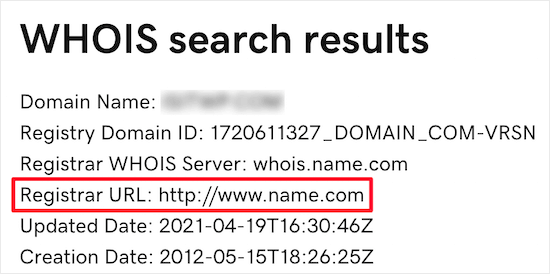
W ant to know how to buy an existing website and get a headstart?
If you’ve already grown a blog and know the ins and outs of the process, you may want to buy an existing website that’s already profitable. This way, you can bypass the Google sandbox and initial link-building process and get going from Jump Street. But you already knew that is why you’re here ;).
In this article, I’ll share some important tips you need to know before you consider buying an existing website. This will help save you thousands of dollars and countless hours of wasted time and maybe even help you avoid getting scammed.
Let’s get started.
In This Guide:
This post isn’t meant to be legal advice but rather a starting point for your further research. Always consult your lawyer, accountant, and relevant business professionals before making these types of financial decisions.
Most of all, don’t rush the process. Take your time doing the due diligence and get information from a variety of trusted sources. You might want to “start at the top,” but you still have to ensure it’s a good decision.
Key Takeaways To Consider When Buying an Existing Website in 2024
- Reasons to Buy an Established Website: Generate immediate revenue. Leverage existing SEO value (i.e., potentially hard-to-come-by links or time and cost-consuming content). You’ll likely also acquire an established audience and mailing list. And reduce initial startup work compared to starting a new site.
- Considerations Before Buying: Ensure the website generates revenue and is in a niche you understand. Verify the site’s history using tools like the Wayback Machine. Assess the website’s SEO performance and traffic. Examine the site’s financial details thoroughly, including revenue sources, expenses, and profit stability.
- Where to Buy Websites: Online marketplaces like Flippa, Empire Flippers, and others. Private purchases directly from website owners.
- Key Steps in the Buying Process: Conduct extensive due diligence to avoid scams. Use tools like WHOIS lookup or ICANN to verify domain ownership. Request access to analytics and financial data. Consider using escrow services for secure transactions.
- Additional Tips: Consider a support period from the seller to ensure a smooth transition. And use contracts and non-compete clauses to protect your investment.
Should I Buy an Existing Website [Or Other Online Business]?
If you’re thinking about buying an established website, you want to make sure you have an idea of what you’re getting into. So, you’ll want to tick off at least one or two of these:
- Does the website generate revenue?
The first reason people buy websites or blogs is because they want to make money or add to an existing stream.
If a website is already generating proven revenue that is a good sign, and you can often find something that is earning well but could be doing better.
Something that happens pretty regularly, for example, is people who have built up a successful blog but no longer have the drive or time to maintain it.
They might have an offline job taking up their time, or they might have just lost the passion for it. These can be good opportunities, in our experience. We’ll get into what you need to look for specifically down below.
- Is the website a niche you know about?
There is no point in buying content websites in a niche that you don’t understand. It can cause a lot of stress and you genuinely won’t enjoy the process.
Of course, there are some exceptions. For example, you might have enough experience with online business that you could purchase the website and then hire someone to manage it.
Or you could manage it yourself an just hire writers to produce the content.
When it comes to the niche, however, it’s best if you know how it works and how it makes money. Running a website is so much more than just producing content.
- Is the website a competitor?
If you already have a website, it might be the case that you want to purchase something that is competing with you.
This is a pretty common business practice. We see it all the time with larger companies (like Facebook buying Instagram) but it can also work on a smaller level.
You would need to make sure that the competitor was large enough to pose a significant threat, and that your own revenue levels were good enough to justify such a decision.
- Could the website become a sister site to your existing website?
Sometimes purchasing a website can be a good idea if it adds to your existing plan. For example, if you’ve got a blog about gardening, then purchasing a website that reviews gardening gloves or tools could be a really nice addition.
Again, this comes back to having a solid blogging strategy and is not something you really take on lightly. Cross promoting websites and blogs can be good if the branding is tight, otherwise it can cause some confusion.
- Is there some SEO value in buying the website?
Another main reason people buy websites is because it can be a way to get new backlinks. This is a somewhat questionable area of SEO practice and is not always legitimate.
The idea is that you look for a website with excellent SEO value so that you can either step in to some good organic rankings that they’ve earned, or else use the new site to link back to your current site. Looking at the rankings is important though.
Even if they’re not making money, you might find that they rank for some quality keywords that you might be able to turn into a profit with your specific knowledge.
- Do they have an exciting mailing list?
Another reason people purchase websites is to acquire the website’s mailing list. As we’ve looked at before, your email marketing list is where you end up making the most money. It is also a good protection from Google’s algorithm changes.
However, it’s not that easy to grow one and can take a long time. If you have reason to believe that a particular site has a large and active mailing list, then it can be useful to purchase that as part of the site, even if the site itself isn’t particularly exciting.
These are the main things people will look for when trying to buy an established website. As mentioned, it’s vital to know why you want to do this before you get into the investigation process. You’ll want to have a very deliberate strategy.
Best Places To Buy Websites?
Once you’ve done your due diligence (that section is below) you essentially have two options on where to buy a website:
- Use a Website Like Flippa
Websites like Flippa specialize in selling online businesses of all sorts. They’re specifically designed to auction or sell domain names and existing websites. You can browse websites for sale in categories like blogs, eCommerce, apps, SaaS, and services.
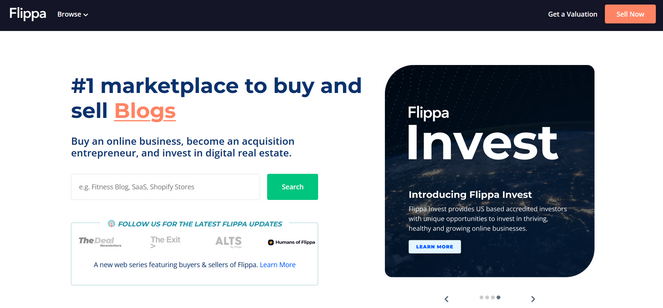
These sites are a good option because the community often weighs in on any “issues” and certain statistics are required when you create a listing.
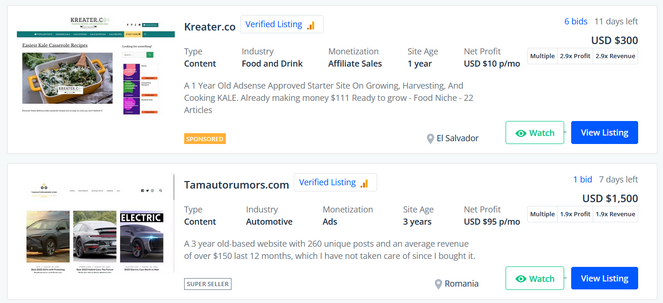
In each listing, you can view important stats like the site age, monetization type, monthly profit, net profit margin, pageviews, and more.
Here’s a video guide from our friends at Ahrefs. Granted it’s a little old by now but much of the information shared still rings true!
Aside from Flippa, other online business and website marketplaces for buying and selling websites include Empire Flippers, BuySellEmpire, Motion Invest, Quiet Light, and FE International. And you can also consider using a trusted and experienced website broker.
- Purchase a Website Privately
This is when you essentially approach a website that you think has potential and ask whether they are willing to sell. You’d then go through a discovery process where you find out all the details and numbers and make an offer.
Of course there are other methods but these are the two main ways that we have seen the most often.
5 Important Factors to Consider Before You Buy a Website
Before you buy a website you need to do a lot of research. And we mean a lot.
This is especially true if you are investing a significant amount of money into the purchase. But, even if it’s only a $1000 website, there’s no point rushing into it and wasting that $1000 that could have otherwise been used on other marketing or content creation.
This is not an exhaustive list by any means, but here are some of the main things you need to consider before you buy.
1. Make Sure You Know Who Owns the Website
There have been stories in the past of people gaining control of a website through malicious means and then selling it while they have control. The result is that the new owner doesn’t really own the new site and the money they paid is likely lost.
To prevent something like that from happening to you, you need to make sure you know who owns the website.
You can use a free WHOIS lookup tool like Domain.com to find out who owns a domain, when it was registered, when it’s set to expired, any available contact information, and more.
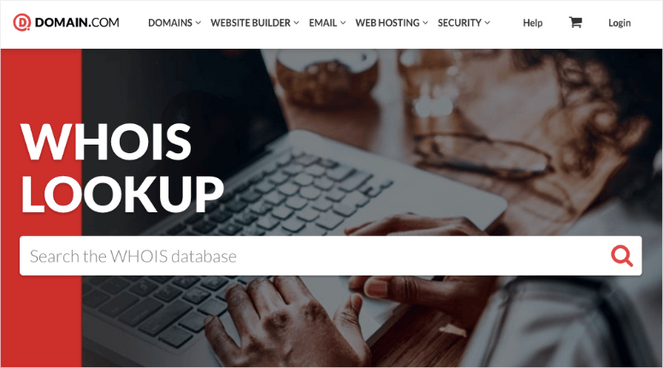
Sometimes, the domain owner’s name and contact information will be hidden for privacy purposes. But, the domain name registrar will still be visible.
In this case, you can email the domain name registrar to let them know that you’re interested in buying the website, and they can forward your request to the owner.
2. Use the Wayback Machine to See a Site’s History
One thing you don’t really want is to purchase a family-friendly site only to discover that two months ago it was actually an adult site or some awful spam thing.
Luckily, free tools like the Wayback Machine can let you see snapshots from a website’s past. Have a snoop around and make sure it has always been legitimate and never used as a link farm or similar.
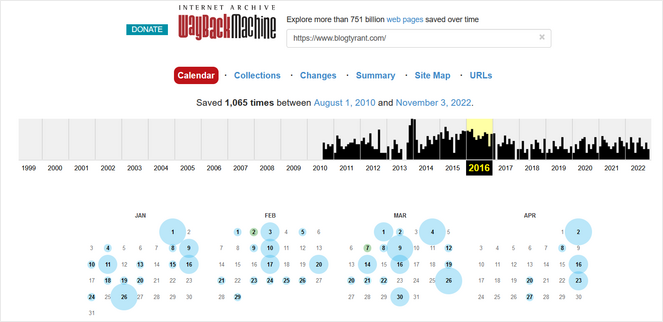
If you look up Blog Tyrant on the Wayback Machine, you’ll see that it’s always been a website that teaches beginners how to start a blog. It simply used to look a lot different than it does now.
3. Look at SEO and Traffic Signals
Before you get too attached to a potential purchase you want to make sure the SEO side of things is looking good. Do a good manual search of Google yourself to see how the website is ranking and then go deeper.
For example, you can use a site like SEMRush to look at the backlinks and other SEO details that may be missing.
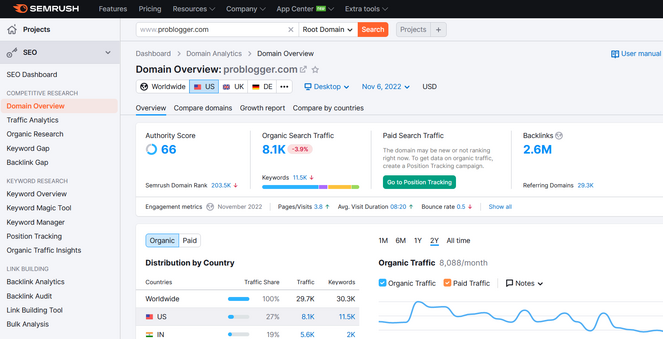
Again, it’s not supposed to be a foolproof method but rather a way to just gain some more information on your potential acquisition.
Here you want to look for some obvious red flags. For example, if the site is ranking on the front page of Google for a good keyword but only has two back links then something fishy is going on. They might be faked, somehow, or you at least run the risk of losing your rankings should those links vanish.
If you’re unfamiliar with SEO, check out our ultimate SEO guide for beginners for more information.
4. Carefully Examine the Stats Provided
When someone posts a listing on Flippa, or you begin negotiating in private, you will always have a lot of stats to look at.
Now, normally they will provide screenshots of all the vital things like traffic numbers, bounce rate, pageviews, content, etc., but I encourage you to ask for logins to their stats accounts to be sure. This is pretty easy. They just have to add your email to Google Analytics and allow you to view-only. It’s no threat to them.
What you want to do now is start comparing the main numbers to previous periods and see if there are any noticeable trends. For example, you might find a massive traffic spike from six months ago and then a huge drop off. This is a red flag because it could mean there was some big advertising spend or lucky backlink and that may be responsible for a large chunk of their recent revenue.
You also want to see if there are any individual posts/pages that are causing the majority of traffic. Again, this represents a risk because the traffic might suddenly drop off or not be all that relevant to your monetization strategy.
5. Details of Revenue and Expenses
One of the most important things you need to look at is the revenue and expenses reports.
Sometimes these will be quite detailed and complex, other times they will be quite simple. Again, there is no harm in asking your accountant or business advisor to take a look at the numbers to make sure you haven’t missed anything.
The main things you want to figure out are:
- How does it earn its revenue?
Where does the money come from and are you happy with the levels? Knowing how the website makes money is important because if it makes the majority of its income from affiliate marketing, for example, it would best that you have experience in affiliate marketing so that you can keep generating that revenue.
- How consistent and stable is it?
Does the money come in consistently and is it likely to keep continuing over the next months and years? You don’t want to buy a website and find out after that it’s not bringing in revenue on a consistent basis.
- Is it diversified?
Make sure to take a look at whether or not the revenue is diverse. If the revenue comes from more than one source, it’s less of a risk. That’s because if one revenue source falls through for whatever reason, the other source can keep your business afloat.
- Is it real?
The hardest part to determine is whether or not the revenue details are real. It’s pretty easy to fake images and reports in Photoshop. So, see if you can get a variety of sources/reports and even ask if you can confirm the details with your own login again.
- Is the profit stable?
Revenue is fine but if you’re making $20,000 a month but your advertising budget is $19,000 then that’s a big risk and represents a lot of work and advertising expertise. Make sure you know where it’s all coming from. The flip side of that is that if you think you can do these things better, you could improve profits.
Although earnings are not everything when it comes to a website, they are important. It’s a big risk to buy a site that is making zero dollars and turn it into something profitable. For beginners it’s always good to look at something that’s relatively established.
Preparing for the Buying Process
Once you’ve done your research, sought advice, talked to the owner, etc., you might finally decide that you want to purchase a website. At that point, you’ll need to cover a few bases:
- Make Sure You Have as Many Details as Possible
Ensure that the seller is willing to give you details like name, phone number, address, business numbers, tax numbers, etc., and then run those details against any government databases that may be available in your country. You want to be 100% sure that this person owns the website contents and domain name and have the authority to sell it.
- Know Exactly What You’re Buying
Make sure you know exactly what you’re buying. Is it the domain name alone or is it the entire website inclusive of the contents, servers, databases, images, mailing list, etc. Be very specific.
- Consider Getting a Contract Made
Contracts are messy, expensive, and sometimes not even that useful (international stuff is hard). That being said, a contract can be useful for outlining a sale process, as well as resolving any issues quickly should some problem arise in the future. Please don’t use stuff taken off the web, instead talk to an IP lawyer in your city.
- Add a Non-Compete Clause
If you’re buying a website from someone it’s good to remember that they have a lot of expertise and connections in the industry. The last thing you want is to spend big on a website and then they go off and make a new one and take your market.
- Ask for a Period of Support
If the original website owner is willing to stay on board for a few months to help you get the hang of the website or even keep producing content until you know how to run it, then you’re onto a winner. That can be a hugely valuable teaching moment for you and your business.
- Use Escrow.com or Similar
Using a site like Escrow allows you to have protections in place for the buyer and seller. For example, they won’t release the domain name until the funds have cleared, and visa versa. They act as an intermediary for both parties, and don’t allow the transaction to be finalized until both parties are happy.
- Purchase in Stages
It is often wise to do the buy in stages. For example, they might send you the databases and give you access to the hosting before you send the money. Once the money is cleared in their account (or Escrow), then they give you access to the domain name or sign it over. The domain name is really the final clearance for a purchase. Until you have ownership and control over that you haven’t bought anything.
- Know How to Get Your Money Back
The last thing we wanted to mention is that sites like Escrow and PayPal often allow you to get your money back should something go wrong or if you are defrauded by someone. Before you start any purchase online (be it a website, car, business, etc.) you should research and find out how that works for each service and in each country.
By now, we might have scared most people out of the whole idea of buying a blog or website that’s already established. While that wasn’t our intention, we do want to make sure you are aware of some of the risks so that your research and transaction can be as smooth as possible.
Remember, buying an existing website might give you a boost closer to the top, but you still have to run it and make it work.
Should I Really Buy an Established Website? Or Start a New One?
At this point, you might still be unsure about whether to buy a website that’s already established or start a new one.
So, here are the pros and cons so that you can weigh both options:
Pros of Buying an Existing Website or Blog
- Existing Audience/Customer Base: When you buy an established website, it will come with an existing audience or customer base that’s already interested in the content or product. You don’t have to work as hard to bring visitors to your site.
- Instant Revenue: If you did your research like we suggested earlier, buying an existing website should come with instant revenue. You don’t have to wait to start making money like you would if you started a new site.
- Saves Time: Buying an existing website means that a lot is already done for you. The website is already built and designed, it’s getting traffic, and it’s earning revenue, which saves you a lot of work.
Cons of Buying an Existing Website or Blog
- Huge Investment: Buying a super successful website can cost as much as $1,000,000. Even moderately successful websites can cost upwards of $5000. So, it’s a huge investment upfront.
- Limited Control: Buying an established website means that you’re limited in what you can do. For example, if the website design or content doesn’t represent your brand well, it might not be wise to change it because you risk losing some of the existing audience.
- No Guarantees: When buying a website, there’s no guarantee that you will get the same amount of traffic or make the same amount of revenue as the previous owner.
Pros of Starting a New Website or Blog
- Cost-Effective: You can invest less than $100 to start a new WordPress website. All you really need is web hosting and a domain name, and we’ll share how you can get a great deal on both below. Plus, there are tons of free WordPress themes and WordPress plugins you can use to design your site and add features to it.
- Full Control: When you start a new website, you have the freedom to build whatever you want. You can design it to match your exact style and choose exactly what content you want to publish or products you want to sell. You don’t have to adhere to what an established website already has in place.
- Ability to Learn New Skills: By creating your own blog from scratch, you’ll learn a ton of useful skills like how to build WordPress websites, market research, writing content, search engine optimization, and more. Learning these skills can be rewarding, and they can even help you bolster your resume.
Cons of Starting a New Website or Blog
- No Instant Revenue: When you start a new blog, you’ll likely have to wait awhile for it to start making money. To get an idea, you can read our article on how long it takes to make money blogging.
- Time-Consuming: Of course, starting a new website will take up lots of your time. You have to spend time building the website, creating content, finding your audience, driving traffic to your site, and more. Many of these tasks are already done for you when you buy an established website.
As you can see, there are solid pros and cons for both buying an existing website and creating a new one. So, it really depends on your specific situation, goals, and budget.
Creating a New Website
If you do decide that you want to create your own blog or website, we recommend using WordPress.org and Bluehost.
WordPress.org is the best blogging platform in the world. It’s easy to use, flexible enough to create any type of website, offers endless monetization options, and it’s free. All you need to pay for is a domain name and web hosting, which is where Bluehost comes in.
Bluehost is the most reliable web hosting service on the market. It comes with 1-click WordPress installation, a free domain name, free SSL certificate, and more.

Plus, Blog Tyrant readers can get 60% off on web hosting by clicking the deal below!
Exclusive offer for BlogTyrant readers
We have partnered up with Bluehost to get 60% off for our readers! You also get to register a FREE domain for a year which normally costs around $14.99 per year.
Claim this Exclusive Bluehost offerWith WordPress.org and Bluehost, you can start a blog for very little money upfront. While you may not make money right away like you would when buying an existing website, there’s less risk if your website isn’t successful because you haven’t spent thousands of dollars on it.
In addition, at Blog Tyrant, we’ve created a ton of helpful guides you can refer to in order to get traffic and make money from your new website. Here are a few:
- Launching a Blog Checklist- 47 Crucial Tasks Before You Launch
- How to Get Traffic to Your Blog (Complete Beginner’s Guide)
- How to Monetize a Blog: 15 Easy Ways to Make Money
How To Buy an Existing Website [or Online Business] In Closing
That concludes this guide on how to buy a website. We hope this article cleared up any confusion about the process of buying an existing website or blog.
Whether you’ve decided to buy an established website or create your own, you might want to check out our guide on how to write blogs that convert. It includes tips to help you create a blogging strategy that will take your business to the next level.
And don’t forget to sign up for our email newsletter so you can get useful content like this sent right to your inbox!

